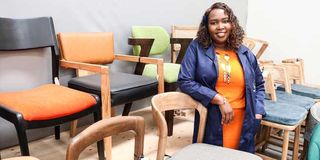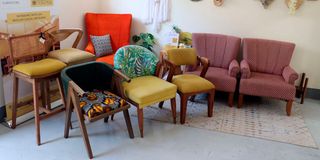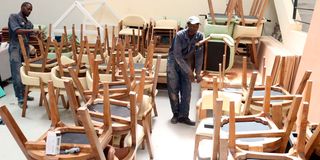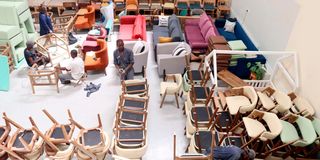Premium
Furniture Zoo: Business ensures functionality and artistry in each bespoke piece

Furniture Zoo Director Emily Wangui at their Worshop in Mlolongo, Machakos County on December 10, 2024.
When Emily Wangui would search for quality furniture for interior design projects, she would often end up frustrated and disappointed.
While high-end imported furniture in Kenya was often overpriced and not customisable, locally made options lacked quality and finish.
Driven by her passion for design, she established Furniture Zoo to offer bespoke, customisable furniture that combines exceptional craftsmanship with premium finishes. Her aim was to create pieces that serve a functional purpose and enhance living spaces, combining beauty with practicality and reflecting each client's unique style.
“I found my passion for interior design at a tender age by innocently rearranging furniture at home to give our spaces a fresh look, much to the amusement of my family. When I moved into my first small SQ, this passion evolved into decorating and personalising my space, making it uniquely mine," she says.
Her interest in design continued to develop over time, and in 2018, she finally undertook formal training in interior design and decoration. Working on several interior design projects, she faced one frustrating challenge after another: how to find unique, high-quality pieces of furniture that would complement her clients' spaces.
This struggle sparked her interest in furniture making and gave birth to Furniture Zoo.
Although she has always considered herself an interior designer at heart, her path to starting Furniture Zoo also hinged on one of life's serendipitous moments online.

Chairs sold at Furniture Zoo pictured on December 10, 2024.
Inspired by Nigerian entrepreneur Jumoke Dada's success with her furniture store Taellio, Emily found a way to design interiors and create custom furniture. She discovered Dada's story through a YouTube interview and found it empowering as a young woman succeeding in the wood and carpentry industry, which aligned with her aspirations.
Furniture business
But starting a furniture business from scratch was more than just a dream—it required considerable effort. Securing funding for warehouse space, machinery, raw materials and staff became the next major hurdle.
“I had planned a vacation in Dubai. Instead, I decided to invest the funds I had set aside for the trip into launching my business. The decision was clear once I realised that the opportunity to build something meaningful, something that could truly transform the furniture industry in Kenya, was far more valuable than a temporary escape,” she says.
The biggest challenges she faced in the early stages of setting up her business were logistics and sourcing materials, particularly the different types of wood used in furniture manufacture.
With no previous manufacturing experience, overcoming these challenges was a steep learning curve, especially in terms of understanding and maintaining quality control.
To overcome these challenges, she relied heavily on the expertise of local artisans and craftsmen, learning from them while building strong, trusted partnerships within her supply chain.
She also spent a great deal of time researching and experimenting with materials and techniques to ensure that the final products met the high standards she had in mind.

Artisans assemble chairs at Furniture Zoo in Mlolongo, Machakos County on December 10, 2024.
“When I was setting up the business, I had limited knowledge of the machinery and tools required for furniture manufacturing. I initially hired a skilled local artisan, whose expertise proved invaluable. He had a deep understanding of the craft and guided me in selecting the right machinery based on the type of furniture we aimed to produce,” she explains.
She also received significant support from local hardware suppliers, who were inspired by the idea of a woman entering the furniture industry and provided valuable recommendations on the best brands and equipment, ensuring she had the durable, high-quality tools she needed to successfully launch the business.
Emily attributes the success of her business to a combination of determination, creativity and strong support from friends and family, who provided the initial capital of around Sh1 million. Over the past two years, she has reinvested significantly to sustain growth and maintain the high standards she set from the outset.
“I focused on delivering high-quality furniture with exceptional craftsmanship and finishing, targeting clients who appreciate bespoke, premium pieces that reflect their unique tastes and lifestyles,” she explains.
Customer relationships
She reflects that these decisions were the bedrock of the business's success: “These choices set the tone for everything processes, designs, and customer relationships. Knowing who you are as a brand and who you are creating for is key to making a meaningful impact.”
Currently, Furniture Zoo works with over 23 skilled local artisans, each contributing their expertise to create high quality, artistic pieces. Emily manages the day-to-day operations, such as site visits, material sourcing, and production, while also focusing on strategic growth, benchmarking, and continuous learning to scale the business.
“For individual clients, the focus is on customisation and creating bespoke pieces that blend beauty and functionality. For hotels and restaurants, the emphasis shifts to durability, ease of maintenance, and scalability, ensuring the furniture can withstand frequent use while maintaining its aesthetic appeal,” she notes.
They conduct a detailed site visit to assess the space, take measurements and understand existing furniture and colour schemes. For clients with specific needs, durability, safety and maintenance are priorities. The aim is to turn the client's vision into a practical, functional and aesthetically pleasing reality.

Artisans assemble chairs at Furniture Zoo in Mlolongo, Machakos County on December 10, 2024.
Since its inception, Furniture Zoo has built a diverse, customisable product portfolio, with each piece tailored to the client's needs. Prices vary based on factors such as complexity, materials and dimensions, with dining table sets ranging from Sh98,000 to Sh250,000 and accent chairs from Sh30,000 to Sh50,000.
"We have seen a growing demand for custom-made furniture tailored to each client's unique taste and space, with a noticeable trend towards lighter-coloured woods and fabrics. This shift reflects a move towards aesthetic-driven design, and modern cleaning solutions have made these choices more practical,” she says.
In the past year, the company has furnished 23 spaces, including restaurants, apartments and spas, and has scaled its operations by investing in local artisans, state-of-the-art machinery and strong supplier relationships.
She notes that social media plays a very important role in driving business and building trust, as well as personal relationships with customers.
Furniture Zoo is focused on growth, particularly in the hospitality sector where there is a high demand for custom, durable furniture. The company plans to expand both locally and internationally, promoting Kenyan craftsmanship worldwide.
Emily also highlights the unique strengths women bring to the male-dominated furniture industry, such as attention to detail and design intuition. With urbanisation driving demand, Furniture Zoo is well placed to capitalise on the growing housing market in Nairobi and beyond.





